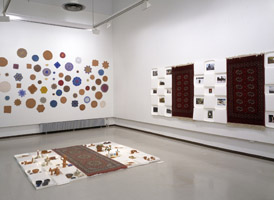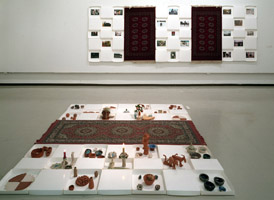About Us
Cultural Comments in Pizza Boxes
In their works, the artist duo Hamm and Kamanger explore cultural interaction and the global movements of plants and people. Their themes range from imported colonial produce to stories from abandoned Iranian village.
Art is not an end in itself for artist Kalle Hamm from Finland and his colleague Dzamil Kamanger from Iranian Kurdistan. Their works occupy an intermediate zone between art, design and handicraft, and are often sparked off everyday things.
Both artists originally met when they were working in a Helsinki pizzeria. They got the idea of creating a conceptual pizzeria of their own. The first part of the resultant exhibition, Pizzeria Babylon I (2000), presented a series of photographs mounted in pizza boxes. Some of the photos were from Kamangerís family album, the rest were taken during his journey from Iran to Finland. The second part, Pizzeria Babylon II, again employed pizza boxes as frames, but this time the pictures were drawings by Hamm. They told about Kurds that the two artists had met in Istanbul, their dreams and Kamangerís sonís move from Iran to Finland.
The duo have continued to explore and comment on multiculturalism and the global movements of goods and people also in their later projects. The theme in Immigrant Garden (2006) was the global routes of familiar decorative and culinary plants. The work presented plants as active ďagentsĒ that had single-mindedly spread around the globe.
I addition to their joint works, Kalle Hamm, also makes drawings. In the series completed in 2008 he drew male figures from history, from Hector to contemporary personages. The men in the drawings represent different professional groups, with members of each sharing the same first name in different languages, for example Mohammad. The 36-part installation evolves into a statement on homosexuality as well as the convoluted history of other contemptible or forbidden things.
Personal is political in the works of Kalle Hamm and Dzamil Kamanger, and the private becomes public. There are many ways of being a man, and of breaking the boundaries of rigid norms. The question of origin acquires a new complexity in the duoís work. At the same time, the work comment on the state of a world that is based on traditional cycles of goods and people.
Marja-Terttu Kivirinta

